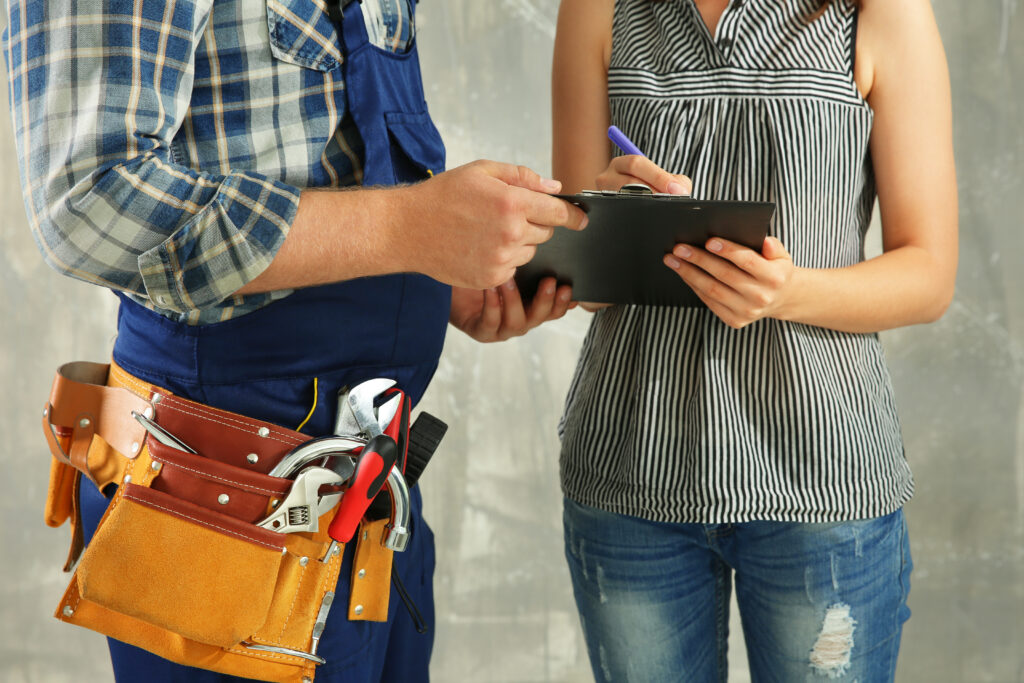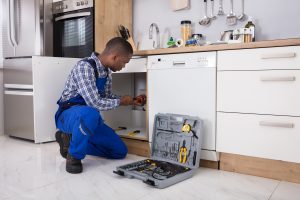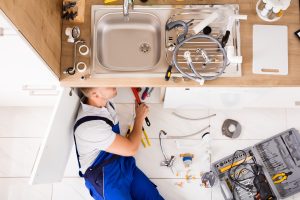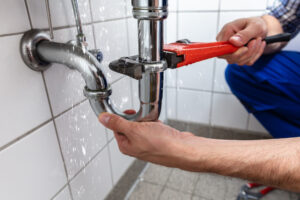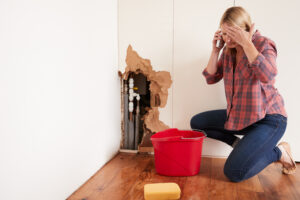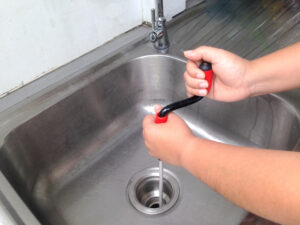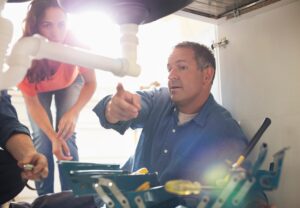
*Updated July 29th, 2025
Plumbing issues always seem to pop up at the worst times—whether it’s a burst pipe in the middle of the night or a clogged drain right before guests arrive. And let’s be honest, calling a plumbing expert isn’t cheap, especially for emergency plumbing services that can cost significantly more than their regular rates.
But here’s the good news: many plumbing problems can be prevented, and when issues do arise, there are ways to save money on your water and keep your utility bill manageable. From simple DIY maintenance to knowing when to call in professional plumbing help (without paying extra for after-hours service), a few smart strategies can save you money and prevent money down the drain.
Ready to keep money in your pocket and extend the lifespan of your plumbing system? Here’s how.
1. Take Care of Leaky Pipes
You might not notice a water leak in old or older plumbing until it’s too late. Most homeowners discover them when there are water stains on the wall or a puddle of water underneath the sink. At that point, the damage is done, and the bills will be high because not only do you have water damage, but you might also have mold growing.
Here are a few plumbing tips to check for leaky pipes:
-
Check your water bill – If your water bill suddenly increases, that’s a sign you may need a plumbing repair. For example, if the water must run continuously, such as in a toilet, you might have a leak.
-
Put food dye in your toilet tank – If colored water appears in the bowl, your toilet is leaking, wasting gallons of water every day.
-
Turn off the water in the house and check the water meter. If it’s running, you have a leak and need a plumbing company to help.
Fixing leaks early can save a significant amount of water and prevent costly water damage.
2. Clean Your Drains
Most people wait until the drains completely clog to clean them, but this is terrible for your home’s plumbing. Instead, clean your drains monthly with a cup of baking soda and vinegar. This great way to save prevents clogs without damaging your plumbing pipes.
Avoid harsh cleaners; they can damage plumbing fixtures and increase your plumbing repair bills. Also, in bathrooms, use strainers to prevent hair and soap buildup.
In the kitchen, scrape food into the trash and never pour grease down the sink. These simple ways to lower your water and plumbing issues reduce the chance of wasting water or paying for emergency plumbing services.
3. Know Where Your Water Shut-off Valve Is
Knowing where your shut-off valve is located can make the difference between severe and managed damage.
Locate and practice using it now so in an emergency you can prevent plumbing disasters. Quick action can save money by preventing wasting water and reducing the need for major plumbing repair.
4. Choose Energy-Efficient Appliances
Energy-efficient appliances, such as low-flow toilets (using only 1.6 gallons of water per flush instead of older 5 gallons of water per flush models), may cost more upfront, but they help you save money on bills each month.
-
Low-flow toilets: Use less water, reduce water waste, and lower the amount of water used.
-
Tankless water heater: Unlike traditional water heaters, these only heat water as needed, which conserves water and energy, reduces water and energy bills, and extends the lifespan of your plumbing system.
-
Set your water heater’s temperature to 120°F. High hot water temperatures waste water and energy.
These updates are a way to save money on both your energy bill and your utility bill.
5. Inspect Your Plumbing Regularly
Once a month, inspect your plumbing system for plumbing issues: slow drains, dripping faucets, or low water pressure. Routine plumbing inspections allow you to address problems early, which can save money on plumbing repairs.
-
Fix dripping faucets and leaks quickly to use less water.
-
Upgrade old plumbing before it breaks.
-
Schedule professional plumbing checks to avoid emergencies.
6. Keep Your Plumbing Layout Simple
If you’re remodeling, plan a smart plumbing layout. Group bathrooms, kitchens, and laundry rooms to minimize materials and labor costs. Keeping your plumbing needs simple makes future plumbing repairs easier and more affordable.
7. Replace Leaking Faucets
A dripping faucet might not seem like much, but it wastes gallons of water and raises your water bill. Fix it immediately to reduce water usage and avoid future plumbing problems.
Final Thoughts
5 plumbing tips to save money: clean drains, check for leaks, adjust water heater temperature, use efficient fixtures, and schedule regular plumbing inspections. These steps help you save money on your utility bill and can save money on your water.
However, when it comes to major leaks, plumbing repair, or gas line issues, call plumbing professionals. A team of plumbing experts can save you money in the long run by fixing issues safely and efficiently.
Don’t wait until you’re waiting for the water to stop flooding your home. Use these plumbing tips to save water, energy, and money—and enjoy lower water bills without sacrificing comfort.
Additional Plumbing Resources
- 8 Questions to Ask a Plumber
- What Qualifies as a Plumbing Emergency?
- What to Do to Prevent Frozen Pipes

Anna has over six years of experience in the home services and journalism industries and serves as the Content Manager at MyHomePros.com, specializing in making complex home improvement topics like HVAC, roofing, and plumbing accessible to all. With a bachelor’s degree in journalism from Auburn University, she excels in crafting localized, comprehensive guides that cater to homeowners’ unique needs. Living on both coasts of the United States has equipped her with a distinctive perspective, fueling her passion for turning any house into a cherished home through informed, personalized decision-making.
Connect with top-rated local contractors who can help you with siding, roofing, HVAC, windows, and more. Get free quotes from verified professionals in your area today.

